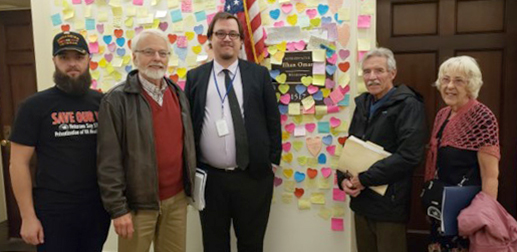
By Jackson Shepherd
I have not been a member of Veterans for Peace (VFP) for long. If you had told me that in less than two years that I would be an activist and organizer spending a week lobbying in Congressional offices, I doubt I would have believed you.
As part of the VFP’s Save Our VA action group, we were in Washington, D.C., to oppose efforts by the Trump administration to dismantle and privatize VA healthcare through the 2019 MISSION Act. We had three teams organized to meet with Congressional representatives. We had 34 meetings with every member of the House Veterans Affairs Committee or their staff.
Our main talking points were as follows:
- Support for House Resolution 701 (calling for full funding and staffing of the Veterans Administration (VA))
- How VA privatization will not help veterans
- There are currently 50,000-plus unfilled job vacancies within the VA
- The MISSION Act’s Asset and Infrastructure Review Commission (AIR) will close VA facilities when we need more of them
House Resolution 701
This resolution supports policies that maintain a robust, fully funded and staffed Veterans Health Administration (VHA) and would not lose care for veterans by moving these resources to the private for-profit sector.
The VA has more than nine million veterans enrolled, which makes it the largest healthcare provider in the country. There has been an 82% increase since 2001 in veterans enrolled in the VA system.
With more veterans coming home due to medical advancements, with longer life spans and as the war zones keep increasing, now is the worst time for the VA to die from within through underfunding and understaffing.
There are many examples from the private sector where profit is the priority, and the vital public interest goes lacking (e.g., the prison for-profit industry). It seemed the government had little care for our bodies and minds while serving, as most of the wars we fight are essentially for profit.
The least our government and the VA can do is keep the promise that President Abraham Lincoln made during his second inaugural speech, “to care for him who shall have borne the battle and for his widow, and his orphan”—a quote that can be seen in VA hospitals and clinics.
As many veterans express, VA healthcare is not a form of despised “welfare” and we are not charity cases. It is our very lives at stake, and the government has an obligation to keep Lincoln’s promise.
It is not easy to get the government to acknowledge things like the impacts of Agent Orange on veterans, even when the VA holds all the records.
Imagine then how much more complicated medical diagnosis and trends could be under the MISSION Act, as more veterans are diverted to private-sector healthcare who are not required to report back to the VA about their diagnoses and treatments of veterans. With this crucial data lost, veterans’ claims for service-connected disability would become even more difficult to secure (and the military would escape accountability for the long-term damage borne by the troops).
Veterans are a small demographic within America. We cannot expect a doctor who only sees non-veterans to be up-to-date on the special healthcare issues that veterans face. At the VA, this is all the doctors see.
A third of the VA staff are themselves veterans, and nowhere else in America will better veteran-specific healthcare be found. Being enrolled in the VA system means that you have VA hospitals and clinics across the country, able to see you and know where to continue service because they can see all of your integrated healthcare information in the VA database.
With more than 50,000 current vacancies, it appears the VA is being set up to fail, so that its saboteurs can say, “The VA is a failure—let’s get the veterans into the community to receive care.” This makes sense in some cases for certain procedures but spells disaster for addressing the growing needs of the veteran population.
A large number of the current job vacancies come from the mental health side, and with 22 veterans a day taking their own life, why is this not being sufficiently addressed? If Trump and other proponents of VA privatization were truly concerned about veterans’ care, they would not let the one place that can care for them fall apart.
If support for service members and veterans is one area that both sides of the political aisle agree on, then why can they not get it together? We should be paying more attention to our political leaders and who is filling their reelection coffers. If their political campaigns rely on donors such as the healthcare industry and Big Pharma, should we really be surprised that they are selling us out?
Asset and Infrastructure Review Commission
Created under the MISSION Act, the AIR Commission is another threat to the VA healthcare system. Remember when they were closing many military bases with the Base Realignment and Closure Commission (BRAC)? This is a similar process but instead applies to VA hospitals and clinics.
Members of the AIR Commission will be appointed by Trump. Whatever recommendations the Commission makes will not be subject to debate in Congress. No discussion, just an “up or down” vote by Congress.
Taking away these facilities amid a staffing and funding crisis, and when more veterans are dying by suicide than are killed in action, is a slap in the face to us all. Even if you personally have never walked into a VA, you likely have someone in your family, or circle of friends, who has used the VA and received vital care there.
Like any system, the VA is not perfect, but largely remains open about how it operates and when its staff make mistakes. This transparency is beneficial, and according to several studies, the VA provides high-quality healthcare that is as good or superior to the private sector.
It is unsettling to hear of VA problems in the news, some of which have been fair criticisms. But when the truth can get out, problems can be solved.
If veteran healthcare was pushed into the private sector, accountability for mistakes would be far less likely, and veterans would pay the price. Once the priority becomes profit, the standard of care will wither. I worry deeply about where this will go if action is not taken.
This has been a rewarding experience, and I look forward to the work to be done. I now know that if a Congressional representative gets even three calls on a single topic in a day, it gets their attention—the more calls, the greater the pressure.
Veteran or not, this is something that should get you concerned. This is especially true now, when most Americans want a nationwide single-payer healthcare system.
We must not let the VA healthcare system slip away, as it is a vital component of achieving quality, universal healthcare. It is no wonder the vultures of this administration want to eliminate VA healthcare at this moment: The VA represents a model of how universal care could work for all Americans.
*****
Jackson Shepherd is a U.S. Army Afghanistan war veteran and an activist-organizer with Chapter 180 of Veterans for Peace. Contact him at fresnovfp@gmail.com.
Advertising

